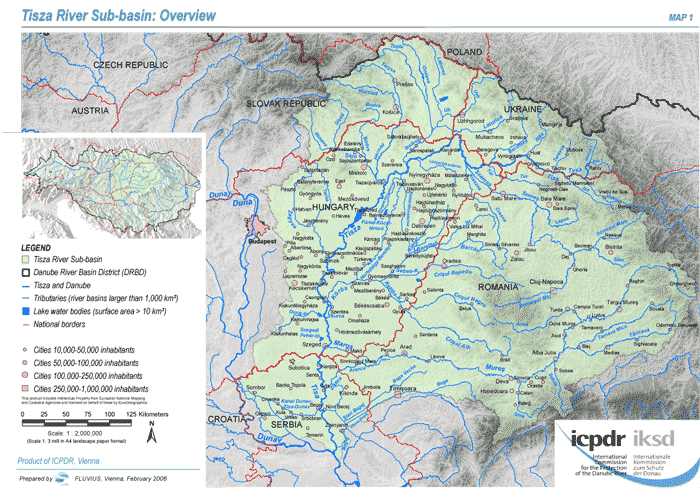- ON THE DECADE
- THE DECADE'S CAMPAIGN
- REPORTING ON PROGRESS
- THE DECADE'S PROGRAMMES
- FOCUS AREAS
-
- Access to sanitation
- Financing water
- Gender and water
- Human right to water
- Integrated Water Resources Management
- Transboundary waters
- Water and cities
- Water and energy
- Water and food security
- Water and sustainable development
- Water and the green economy
- Water cooperation
- Water quality
- Water scarcity
- FOCUS REGIONS
- RESOURCES FOR
- UN e-RESOURCES
International Annual UN-Water Zaragoza Conference 2012/2013
Preparing for the 2013 International Year. Water Cooperation: Making it Happen! 8-10 January 2013
Tisza River Basin Cooperation
The Tisza River Basin shared by 5 countries is the largest sub-basin in the Danube River Basin, covering 157,186 km² or 19.5% of the Danube Basin. Together with its tributaries, the Tisza River drains the largest catchment area in the Carpathian Mountains before flowing through the Great Hungarian Plain and joining the Danube River.
The International Commission for the Danube River Basin (ICPDR) established the Tisza Group for coordination as well as implementation of basin-wide cooperation based on a Memorandum of Understanding. The Tisza Group is the platform for strengthening coordination and information exchange related to international, regional and national activities in the Tisza River Basin and to ensure harmonization and effectiveness of related efforts.
The work is being carried out since 2004 in the frame of the ICPDR Tisza Group with the involvement of all five countries from the Tisza River Basin and the European Union (EU). The work is supported by the ICPDR Experts groups, observers (NGOs, stakeholders), EU, Global Environment Fund (GEF), United Nations Development Programme (UNDP), United Nations Environment Programme (UNEP) funds.

Tisza River Sub-basin overview map.
Source: International Commission for the Danube River Basin (ICPDR).
The ICPDR serves as the platform for coordination in the implementation of the EU Water Framework Directive on issues of Danube Basin-wide importance and coordinates the elaboration of a Tisza River Basin Management Plan through its Tisza Group. Transboundary issues not covered by the ICPDR are solved at the appropriate level of cooperation such as in the frame of bilateral river committees/international agreements.
Local/regional issues remain a national task. Coordination efforts, conducted mainly through the respective Ministries responsible for water and environment issues, have been largely directed at inter-ministerial coordination.
>> Organizers
>> Key questions
>> Expected outcomes
>> Agenda
>> Participants
>> International Year and WWD 2013
>> UN initiatives on water cooperation
>> UN Water Convention
>> UN Watercourses Convention
>> Challenges for water cooperation
>> Addressing cooperation: tools and mechanisms
>> Mediation and dispute resolution mechanisms
>> Alternative Dispute Resolution Approaches
>> Water cooperation: nations and stakeholders
>> Water cooperation in rural areas
>> Water cooperation in cities
>> Interview questions for case study presenters
>> World Water Day 2013
>> World Water Week 2013
>> The UN Global Compact
>> Intensively developed aquifers
>> Stakeholders platforms in Spain
>> Field visits
>> Cases on water cooperation
>> Conference daily
>> Conference flyer
>> Conference interviews
>> Conference poster
>> Information briefs
>> Presentations from participants
>> UN water cooperation reports
>> Video interviews with participants
>> Video recording of sessions
>> Water cooperation in the media
>> Web banners
Copyright | Terms of use | Privacy notice | Site Index | Fraud alert | Help




